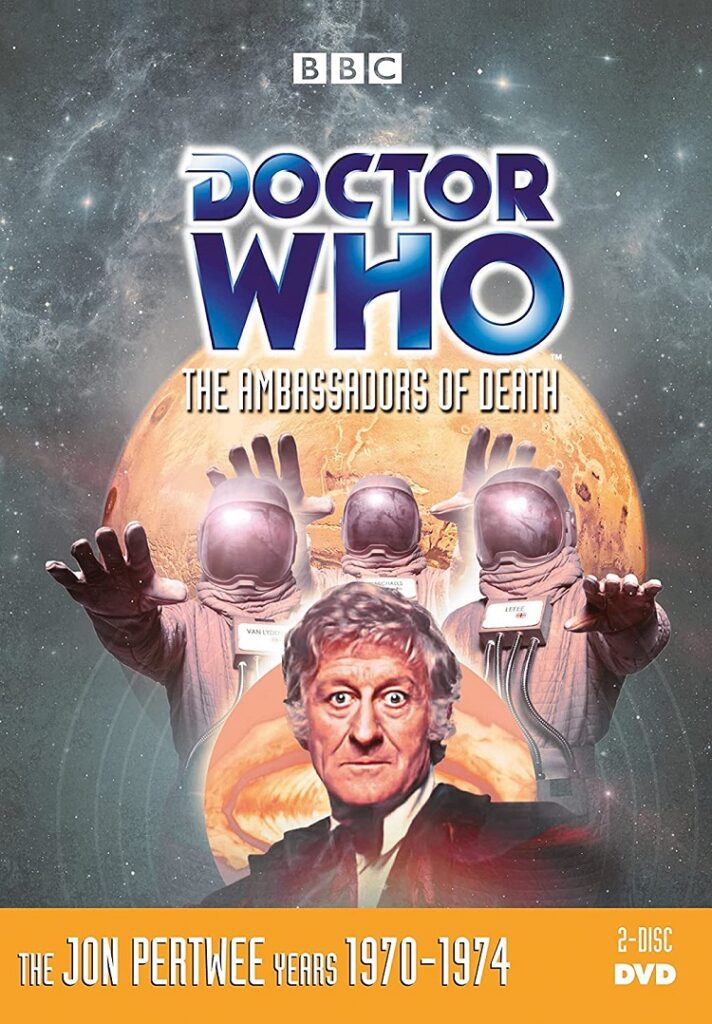
In January of 1970, the Seventh Season of Doctor Who started with Jon Pertwee taking the reins as the Third Doctor. Patrick Troughton had held the spot from 1966 to 1969 traveling through time and space. Pertwee would be exiled to 20th Century Earth. His appearance would bring many changes to what had become the core Doctor Who stories. The series would finally change to all-color episodes, the series would be anchored in 20th Century England, there would be a more consistent cast of characters, and the series would have shorter seasons with longer serials. The second serial of his run was seven episodes and the third, The Ambassadors of Death was also seven episodes running from March through May of 1970. The story is the 53rd of the series and was just released on a 2-disc DVD by BBC.
I’ve had a chance to review some of the later Pertwee stories, including the wonderful Three Doctors, but this is a great peak into the start of a new evolution of the most important science fiction show of all-time. The Doctor is working with UNIT (United Nations Intelligence Taskforce) and his companion, Liz Shaw, is an employee of UNIT. I’m not really familiar with Liz Shaw but she seems very intelligent and confident compared to many of Troughton’s companions.
The British Space Program had sent a crew into orbit to make contact with a Mars Probe 7 that had lost contact with Earth months before. The astronauts make contact but then there’s a weird sound and all contact is lost. The Doctor and Liz don’t head to space to research the problem (that’s what would happen with a more modern Doctor) – instead they choose the more budget-friendly attack of trying to figure it out at the Space Control Center.
This is a very simple set-up to what ends up being a hugely convoluted story that seems to take wrong turns just to extend the series to the full seven episodes. The astronauts return while there is a battle going on between UNIT troops and troops from the Space Security Department. Just when we are to meet the astronauts, they are kidnapped and it might be aliens in their spacesuits anyways. So, it’s off to get the Alien Ambassadors back to the spaceship so the real astronauts can come home. The rescue of the astronauts becomes secondary to a cautionary tale where the Alien Ambassadors are being set-up to be portrayed as dangerous killers to turn public opinion against them.
The idea of the misunderstood Martians is a wonderful science-fiction tradition. This story shares some influences with Ray Bradbury’s The Martian Chronicles, the Hammer Horror film The Quatermass Xperiment, and some of the classic works of Heinlen. There’s the promise of the first couple episodes – the idea of the disappearing astronauts and then the mystery of the Alien Ambassadors. The series devolves over the last few episodes to a bunch of stops and starts and dead ends. The title of the story is The Ambassadors of Death – a story that would lead one to believe there would be lots of death that there isn’t. The subplots and conspiracies become hard to follow and never fully seem to deliver. I think the writers could have narrowed this down to a solid four-episode story.
The Doctor and his companion Liz are very pleasant together. I like their chemistry but feel it isn’t taken advantage of. There is an overall feeling that starts in these color episodes through all of the 1970s that budgetary concerns effect the telling of the stories. The sets are what people think of when you say 1970s BBC science-fiction show. The move of the series to modern-day England allows for some actual outdoor scenes – something we haven’t seen up to this point. But the story just doesn’t deliver the tight, satisfying conclusion that I find in many of the shorter stories of this time period.
The two-disc set is full of interesting extras. That’s been the hallmark of these current BBC releases – the ability to watch the stories out of context and get a good background on the series. The Audio Commentary includes Caroline John who plays Liz Shaw (I want to watch more of her short run with the Doctor) and script editor Terrance Dicks among others from the production. There’s a “Tomorrow’s Times – The Third Doctor” that gives a good overview of Pertwee. For those more interested in the making of the story there’s “Mars Probe 7: Making The Ambassadors Of Death.”
These episodes are an interesting transition from Troughton’s Doctor. Pertwee’s adventures take a more traditional science-fiction turn while being anchored in time for once. This leads to more traditional adventures along the lines of Star Trek. I like how the Doctor and Liz work together – her intelligent character is a nice change of pace. But the second half of the story doesn’t live up to the excellent first half. There’s too many bloated secondary stories that needed some editing. A serial show that airs for thirty minutes weekly needs fewer characters and more action to pull the viewer through. When viewed as a single story ,it still needs simplifying. I’ve enjoyed meeting this Third Doctor and I know from previous releases that his work with UNIT with improve.